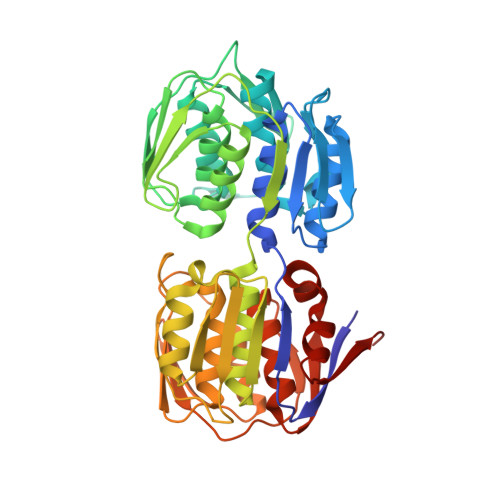Functional Consequence of Covalent Reaction of Phosphoenolpyruvate with UDP-N-acetylglucosamine 1-Carboxyvinyltransferase (MurA).
Zhu, J.Y., Yang, Y., Han, H., Betzi, S., Olesen, S.H., Marsilio, F., Schonbrunn, E.(2012) J Biological Chem 287: 12657-12667
- PubMed: 22378791
- DOI: https://doi.org/10.1074/jbc.M112.342725
- Primary Citation of Related Structures:
3SPB, 3SU9, 3SWA, 3SWD, 3SWE, 3SWG, 3SWI, 3SWQ, 3UPK, 3V4T, 3V5V - PubMed Abstract:
The enzyme MurA has been an established antibiotic target since the discovery of fosfomycin, which specifically inhibits MurA by covalent modification of the active site residue Cys-115. Early biochemical studies established that Cys-115 also covalently reacts with substrate phosphoenolpyruvate (PEP) to yield a phospholactoyl adduct, but the structural and functional consequences of this reaction remained obscure. We captured and depicted the Cys-115-PEP adduct of Enterobacter cloacae MurA in various reaction states by X-ray crystallography. The data suggest that cellular MurA predominantly exists in a tightly locked complex with UDP-N-acetylmuramic acid (UNAM), the product of the MurB reaction, with PEP covalently attached to Cys-115. The uniqueness and rigidity of this "dormant" complex was previously not recognized and presumably accounts for the failure of drug discovery efforts toward the identification of novel and effective MurA inhibitors. We demonstrate that recently published crystal structures of MurA from various organisms determined by different laboratories were indeed misinterpreted and actually contain UNAM and covalently bound PEP. The Cys-115-PEP adduct was also captured in vitro during the reaction of free MurA and substrate UDP-N-acetylglucosamine or isomer UDP-N-acetylgalactosamine. The now available series of crystal structures allows a comprehensive view of the reaction cycle of MurA. It appears that the covalent reaction of MurA with PEP fulfills dual functions by tightening the complex with UNAM for the efficient feedback regulation of murein biosynthesis and by priming the PEP molecule for instantaneous reaction with substrate UDP-N-acetylglucosamine.
- Drug Discovery Department, Moffitt Cancer Center and Research Institute, Tampa, Florida 33612, USA.
Organizational Affiliation:
















